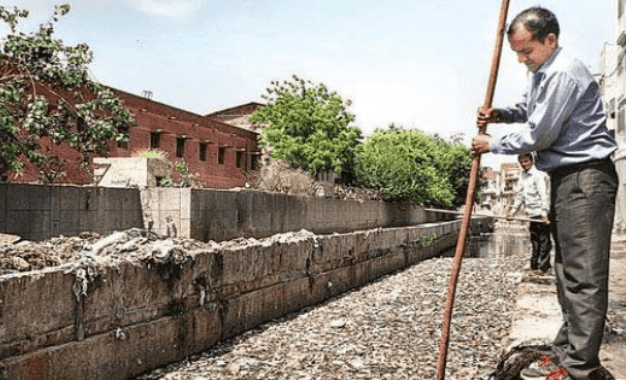Neeraj Kumar, 34, is a political science graduate from Delhi University. He has a government job: cleaning manholes full of toxic gases and un-clogging excreta-filled sewers.
Kumar’s neighbours believe he is lucky to have found a government job. Few know the ‘shit’ he handles everyday. Kumar wakes up at 6 am and leaves home to work as a beldar in East Delhi Municipal Corporation. “My life is a load of shit,” Kumar tells LokMarg with a wry smile.
I was brought up in a small family at Loni, Ghaziabad, which borders northeast Delhi. My father was in a private job and always wanted me to have a government job. Those days, in our locality it was a big deal for a family to have a member who could secure a ‘permanent sarkari naukri (government job)’.
I was still in Class 12 when the responsibilities to run the family fell on my shoulders; I would spare you the details but we all know it takes no time to lose a lala-ki-naukri (private sector job). Right after my board exams, my father advised me to go through the gazettes that notified various government jobs.
I came across an advertisement by the Municipal Corporation of Delhi (it was a unified body then) for the post of a beldar; matriculates were eligible to apply. It was a temporary position, but the advert claimed that the recruits will eventually be merged into regular employment. Hard-pressed for a job, and seeing it as one of best opportunities, I applied, and got through.
Beldar is a common term for manual labourer but little did I know that MCD Beldar is a euphemism for manual scavenger. I had once dreamt of joining the Army and there I was, holding a broom and a khapachhi (long slit-bamboo) in my hands. My brief was to pull out rubbish and excreta from the city drains.
On my first day at work, I felt like crying at the cruel joke. Initially, it was demeaning to perform the beldar work, considering the nature of the job, but my necessity kept me going. There was no other option. I didn’t lose hope. I was confident that eventually I would progress and be promoted to a senior level. Some of my seniors also encouraged me to continue with my education. I thought that if I kept studying, the chances of my being promoted will brighten.
Without losing a single year, despite long hours of work, I managed to secure a degree in Political Science from Delhi University. It has been 14 years since I joined the civic body and almost 11 since I graduated.
I am still waiting for being absorbed as a regular employee, let alone be promoted. Thankfully, I do not have to enter inside the drain. That kind of dangerous work is given to private contractors. But the stench in the drains is unbearable; the toxic gases we inhale throughout the day definitely affect our health; our mouth and nostrils are covered most of the time during work.
No, we do not have any safety gear for protecting ourselves. And if you read various studies on the health hazards in the nature of work we perform, we are prone to severe allergies and skin cancer. When I go back home, I am very particular about not coming in contact with my children till I have had a bath. I do not want to put the life of my family at risk.
I keep reading in the media about the conditions of manual scavengers and hope that the government and the civic bodies will wake up to invest in machines and better technology for the work. The work always begins early in the morning and last till 9 pm.
Yet, there are often delays in our salary as the municipal body routinely runs dry. While I miss my dream, I have come too far to nurse any regrets. Maybe I have got used to it but I believe it is too late for me to find something that would suit my qualification. As a father of two, I only hope they will do well in life and achieve what they want to. I do not want them to settle for a menial job for the sake of a government job.
—With editorial assistance from Lokmarg
